Windsor Castle - a Brief History
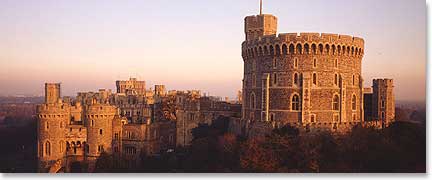
Windsor Castle is an official residence of The Queen and the largest occupied castle in the world. A Royal home and fortress for over 900 years, the Castle remains a working palace today.
Visitors can walk around the State Apartments, extensive suites of rooms at the heart of the working palace. For part of the year visitors can also see the Semi State rooms, which are some of the most splendid interiors in the castle. They are furnished with treasures from the Royal Collection including paintings by Holbein, Rubens, Van Dyck and Lawrence, fine tapestries and porcelain, sculpture and armour.
Within the Castle complex there are many additional attractions, including the Drawings Gallery, Queen Mary's dolls' house, and the fourteenth-century St. George's Chapel, the burial place of ten sovereigns and setting for many Royal weddings.
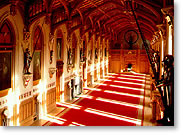
Windsor Castle is the oldest and largest occupied castle in the world.
Over a period of nearly 1,000 years it has been inhabited continuously, and altered and refurbished by successive monarchs. Some were great builders, strengthening the Castle against uprising and rebellion; others, living in more peaceful times, created a palatial Royal residence.
William the Conqueror chose the site, high above the river Thames and on the edge of a Saxon hunting ground. It was a day's march from the Tower of London and intended to guard the western approaches to the capital.
The outer walls of today's structure are in the same position as those of the original castle built by William the Conqueror in the 1070s. So too is the central mound supporting the Round Tower and the Upper Ward, where successive monarchs have had their private apartments since the fourteenth century.
In the 1170s Henry II rebuilt - in stone instead of wood - the Round Tower, the outer walls of the Upper and most of the Lower Ward, and the Royal apartments in the Upper Ward.
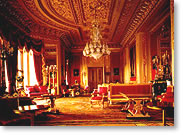
In the 1360s Edward III, who was born at Windsor, extended the Castle. He created the immense St. George's Hall for the use of the Knights of his newly founded Order of the Garter.
St George's Chapel was begun by Edward IV (r. 1461-70 and 1471-83) and completed by Henry VIII. It is dedicated to the patron saint of the Order of the Garter, Britain's highest order of chivalry, and ranks among the finest examples of late medieval architecture in Western Europe.
Ten British monarchs lie buried in the chapel: Edward IV, Henry VI, Henry VIII, Charles I, George III, George IV, William IV, Edward VII, George V and George VI.
Oliver Cromwell captured Windsor Castle after the Battle of Edgehill in 1642, and for the rest of the Civil War it became a prison as well as the headquarters of the parliamentary forces.
In 1648 Charles I was held there before his trial and execution in London; his body was brought back for burial in St. George's Chapel during a snowstorm.
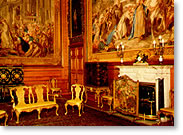
Following the Restoration, Charles II was determined to make the Castle as splendid as possible. He created a new set of State Apartments in the 1670s, using the skills of the architect Hugh May, the artist Antonio Verrio for murals and ceiling paintings, and the famous wood-carver Grinling Gibbons.
The King's Dining Room and the Queen's Presence and Audience Chambers retain many of these original features. Charles II also laid out the 5km Long Walk leading due south from the Castle into Windsor Great Park.
George IV was a great lover of art and fine decoration. Much of Windsor Castle's present appearance is due to the alterations he instigated in the 1820s with his architect, Sir Jeffry Wyatville. The buildings were refashioned in the Gothic style, with the addition of crenellations, turrets and towers.
In the Upper Ward the private apartments were moved from the north side of the quadrangle to the south and east side. The rooms on the north side were designated, as now, as for use on formal occasions and State visits.
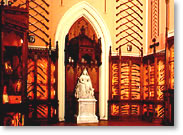
One of George IV's most remarkable additions was the Waterloo Chamber, which was created in the 1820s to show portraits commissioned from Sir Thomas Lawrence to commemorate the defeat of Napoleon at the battle of Waterloo in 1815.
They represent the monarchs, soldiers and statesmen who were involved in that defeat and its aftermath. They include George III, George IV and the future William IV, the Duke of Wellington, Field Marshal von Blucher, the Emperors of Austria and Russia, the Kings of Prussia and France, and Pope Pius VII.
Queen Victoria and Prince Albert were devoted to Windsor, where they spent much of their time. It was during the reign of Queen Victoria that, in 1845, the State Apartments were first opened to the public.
Prince Albert died of typhoid at Windsor in 1861 and was buried in a spectacular mausoleum that Queen Victoria constructed at Frogmore in the Windsor Home Park.
During the Second World War, Windsor Castle was home to the young Princesses Elizabeth and Margaret Rose while their parents supported the war effort in London and around the country. Today The Queen uses the Castle regularly, spending most of her weekends there.
The twentieth-century history of the Castle is dominated by the major fire that started on 20 November 1992. It began in the Private Chapel, when a spotlight came into contact with a curtain and ignited the material.
It took 15 hours and one-and-a-half million gallons of water to put out the blaze. Nine principal rooms and over 100 other rooms over an area of 9,000 square metres were damaged or destroyed by the fire, approximately one-fifth of the Castle area.
The next five years were spent restoring Windsor Castle to its former glory. It resulted in the greatest historic building project to have been undertaken in this country in the twentieth century, reviving many traditional crafts.
The restoration was completed six months ahead of schedule on 20 November 1997 at a cost of 37 million GBP (US $59.2 million), 3 million GBP below budget. Seventy per cent of the necessary revenue was raised from opening Buckingham Palace's State Rooms to visitors in August and September.
The remaining 30 per cent of the cost was met from savings in the annual Grant-in-Aid funding from Parliament for the maintenance and upkeep of the occupied Royal Palaces. The restoration was undertaken at no additional cost to the taxpayer.
To mark the completion, The Queen and The Duke of Edinburgh held a 'thank you' reception in the restored rooms on 14 November 1997 for 1,500 contractors. On 20 November that year they celebrated their Golden Wedding Anniversary with a ball also held at Windsor Castle.
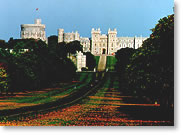
Windsor Castle may be 900 years old, but it continues to play a large part in the official work of The Queen and members of the Royal Family.
Today The Queen uses the Castle both as a private home, where she usually spends the weekend, and as a Royal residence at which she undertakes certain formal duties.
Every year The Queen takes up official residence in Windsor Castle for a month over Easter (March-April), known as Easter Court. During that time The Queen hosts occasional 'dine and sleeps' events for guests, including politicians and public figures.
The Queen is also in residence for a week in June, when she attends the service of the Order of the Garter and the Royal Ascot race meeting.
The Order of the Garter ceremony brings together members of the senior order of chivalry for a service in St. George's Chapel. Beforehand, The Queen gives a lunch for the Knights of the Garter in the Castle's Waterloo Chamber.
Any new Knights of the Garter are invested by The Queen in the Garter Throne Room. On the walls are portraits of monarchs in their Garter Robes, from George I to the present Queen, whose State portrait by Sir James Gunn was painted in 1954.
Windsor Castle is often used by The Queen to host State Visits from overseas monarchs and presidents. Foreign Heads of State enter the Castle in horse-drawn carriages through the George IV Gateway into the quadrangle in the Upper Ward, where a military guard of honour is drawn up.
The traditional State Banquet is held in St George's Hall (55.5m long and 9m wide), with a table seating up to 160 guests.
Recent State visits held at Windsor Castle include those of President and Mrs. Mbeki of South Africa (2001), and King Abdullah II and Queen Rania of Jordan (2001), as well as a special visit by President and Madame Chirac of France to mark the centenary of the Entente Cordiale (2004).
St. George's Chapel remains an active centre for worship, with weekly services. The Chapel is a Royal Peculiar, that is, a chapel which is not subject to a bishop or archbishop but which owes its allegiance directly to the Sovereign.
The Chapel is administered by the Dean and Canons of Windsor, who, with their officers and staff, are called the College of St George.
Many Royal weddings have been celebrated in St. George's Chapel, most recently that of Prince Edward and Miss Sophie Rhys-Jones in June 1999.
Funerals such as those of Princess Margaret and Princess Alice, Duchess of Gloucester, have also taken place there. Queen Elizabeth The Queen Mother lies buried in the Chapel with her husband, King George VI, and Princess Margaret, her younger daughter.
Various departments of the Royal Household are based at Windsor Castle. The ancient Round Tower houses the Royal Archives and the Royal Photograph Collection.
The Print Room and Royal Library house precious drawings, prints, manuscripts and books in the Royal Collection. These are shown in a programme of changing exhibitions in the Castle's Drawings Gallery.
Those who live and work within the Castle include the titular head of the Castle community, the Constable and Governor of Windsor Castle; the Dean of Windsor, Canons and other staff who run St George's Chapel; the Military Knights of Windsor; the Superintendent of Windsor Castle and his staff, who are responsible for day-to-day administration; the Housekeeper and her staff; and soldiers who mount a permanent military guard in the Castle.
Windsor Castle is also a busy visitor attraction. Many parts of the Castle are open to the public, including the precincts, the State Apartments, Queen Mary's famous dolls' house, St George's Chapel, and the Albert Memorial Chapel.
When The Queen is in official residence, Changing the Guard provides a colourful spectacle in the quadrangle.